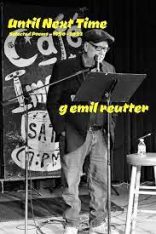May 22 2024
London Grip Poetry Review – G Emil Reutter
Poetry review – UNTIL NEXT TIME: Charles Rammelkamp finds the blues running through this major retrospective collection of g emil reutter’s poetry
Until Next Time g emil reutter Alien Buddha Press, 2023 ISBN: 979-8392218066 211 pages $15.00
You know you’re a venerable poet when you publish a “new and selected” volume, which really amounts to a “greatest hits” book. Until Next Time includes selections from g. emil Reutter’s work going back to 1990, from his Jonesville Collection, Plain Speak/Sweet Speak and Life Views through Eating Raw Meat and Other Nuances of Life, Farmers, Trains, Queens and Clowns and Thunder, Lightning and Urban Cowboys and everything in between, some fourteen volumes of poetry (not counting his collections of fiction). Organized in a sort of time-machine manner, Until Next Time starts with selections from Reutter’s most recent books and works backward, the final poem, “My Katie,” a tender meditation on fatherhood, from the earliest in the collection. It’s a sweet poem that might serve as a metaphor for the entire book, compact, three-line stanzas that start with a description of holding the newborn daughter, then watching her first steps, her growth through the years, and concluding,
Watching her grow,
letting go,
wanting her to be a child again.
Just so, pride and nostalgic regret mingle throughout the collection, the nagging impulse for do-overs, for repeats and revisions, to simply stop time dead in its tracks, often in response to grief, that emotion that dogs our lives from cradle to grave. In a word, it’s the blues, an attitude Reutter channels and expresses so eloquently.
The poem, “Blues,” from Asphalt Road captures the essential mood as well as the cathartic healing powers of blues music, the same effect reading Reutter’s poems can have.
a mug of beer, shot of turkey on bar
bass is vibrating against walls
Mr. Johnson’s music causes body to sway
bartender refills my glass
smoke between my lips, take a long drag
downing shot and mug, relax
blues heal me, I glance to my right
order another round for the two of us.
That’s Robert Johnson on the jukebox – or performing in a juke joint not unlike the tavern where the poet is sitting, drinking.
“A.J.’s Blues Night” from Thunder, Lightning and Urban Cowboys embodies the same vibe but in shorter, punchier lines:
Dancers fill the floor
grinding to the bass
of the blues band
singing of lost love
of lost life
Reutter writes about so many memorably anonymous characters, from McDuffy, in the poem “Tea Blender” and “Long Legged Larry” in the most recent book to the tough guy in the bar in “Know Where You Belong” from Carvings, “Charlie” in Blue Collar Poet, and “The Widow” in Stirring Within. The reader feels their bluesy outlook, what they are going through, their challenges. The widow kneels
in front of the marker
consisting
only of a weapon, helmet, dog tags
trembling
The poet grieves with her for her loss, only to experience the humbling realization that he can never fathom the depth of her loss, not really. And yet, he does.
As the title of the collection, Farmers, Queens, Trains and Clowns, suggests, his poetry is filled with renegades and outlaws, if not downright crooks. But usually they are just regular folks living drab lives of constant low-level hardship. Take the waitress in “November in a Diner” from Stale Bread and Coffee:
Varicose veins hidden under knee highs
36 years walking this floor watching as
young ones come and go she collects
tips, works the hours, pulls the shifts
slings plate after plate across the tables
never a spill. The counter full of lonely
old men….
But the waitress is not a complainer. The poem ends: ‘She counts her tips, rests her swollen / feet on the seat across from her.’ She’s resigned to her fate. She endures her own blues.
Then there are sad characters like “Trina,” from Farmers, Trains, Queens and Clowns, a woman who’s been jilted by her lover but
She came to this bar for it was his bar
her eyeliner was thick, her ruddy skin
covered by foundation, her straw like
hair dyed blond.
Trina sits at the bar watching her man hold court with his crew, downing glasses of wine and gin at the far end of the bar, until she sees him walk out of the club with another woman, and she makes a fool of herself yelling that she loves him. Truly cringe-worthy. As they say, it takes all kinds to make a world.
Reutter is a poet of Philadelphia. He loves his city; he bleeds for his city. “Philadelphia,” from Farmers, Trains, Queens and Clowns (‘I dream of my city, of Philadelphia, of a / time when peace will come to its streets’); “Philadelphia – August 14, 2019,” from Violence – In My City (‘I feel my city / never ending violence / of guns, senseless shootings….”); “City of Brotherly Love,” from Stale Bread and Coffee (‘It’s a day like the previous two / heat and ozone warnings….’): just a sample of a recurring theme that is also curiously wrapped up with the blues.
And Reutter? Don’t worry, he’s not going anywhere. You’ll find him there in Philadelphia, just north of Oxford Street. He’s just left us with thirty years of his bluesy poetry, “until next time.”

Welcome | g emil reutter
23/05/2024 @ 12:16
[…] https://londongrip.co.uk/2024/05/london-grip-poetry-review-g-emil-reutter-2/ . […]